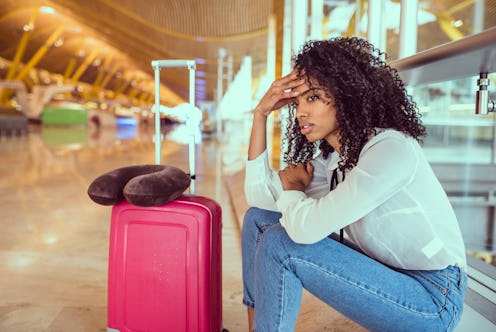Life
A Therapist Explains How To Cope With A Panic Attack If You’re Traveling Alone

Time for a confession: During one of my recent solo travel experiences, I had a panic attack so intense that the flight attendant literally sat next to me and held my hand. Although I was kind of mortified, incidents like these are pretty common. Luckily, traveling alone can be anxiety-inducing, but a therapist tells Bustle that there are plenty of ways to manage those feelings.
For me, actually being in an unfamiliar location doesn’t bring much anxiety, but traveling there does. Flying is the most nerve-wracking part of any trip. And if I’m going by myself, the anxiety gets even worse, because I don’t have my partner with me to provide distracting conversation or comfort when the turbulence gets rough. If you’re prone to anxiety and/or panic attacks while flying, I recommend trying a few grounding techniques, like breathing exercises or journaling. My anxiety is always helped by downloading movies on my laptop for the flight, working on a crochet project, and enjoying a glass of wine or taking an herbal stress-relieving supplement.
I also recommend telling people who can help you about your anxiety, like I did with the flight attendant. It can feel embarrassing, but people who work in the travel industry both experience anxiety and witness others experiencing anxiety often. Their expertise might be useful to you in those difficult moments.
Once you land in your destination, you can also feel overwhelmed being by yourself. I find that scheduling phone calls with my loved ones helps with this feeling. I don’t have to deal with the anxiety of waiting for them to pick up, because they know I’m calling. And during that phone call, I can talk through my anxious feelings or get advice about particular situations. One time, I got really sick while I was traveling. It helped to call my father, who’s a doctor, to talk about my symptoms and decide whether I should go to urgent care or not.
Denver, Colorado-based therapist Jasmine Crane says that preparation can also help with traveling anxiety. “Getting to the airport on time, making sure you check your flight information, that you have everything that you need.” Crane also points out that some people feel comforted by special objects, like religious texts or jewelry, especially if those objects remind them of a person they’re leaving behind while they travel. Crane tells Bustle that, “Whatever makes you feel safe,” can help with anxiety.
Crane also says that for travelers of color — especially Black and Latinx folks, or people whose Muslim identity is racialized — anxiety can be “exacerbated.” She points out that for people who already experience criminalization because of their identity, “going through security at the airport [can feel like] a similar process to what they do when you go to jail.”
Traveling alone can be a rewarding experience, but it pushes you so far out of your comfort zone. And that unfamiliarity can bring anxiety. But Crane says that solo travel can be an incredibly rewarding adventure, particularly for Black women like herself. Crane, who took her first solo trip 10 years ago, tells Bustle, “I actually recommend that women try going on vacation solo once in their lives. I think it's one of the most invigorating and empowering things I've ever done for myself.”
Crane says that even though it can be anxiety-inducing at first, traveling can bring many mental health benefits, helping people to become “more openhearted and more open-minded or flexible in their thinking.” Crane adds that it also causes travelers to “feel more connected to different cultures… and [reach] self-transcendence, which is a sense of connection to something larger than you.”
But Crane acknowledges that being in an unfamiliar city or country by yourself can feel dangerous, especially for women and non-binary people. A 2018 study conducted by the organization Stop Street Harassment found 81% of women experienced sexual harassment. With realities like this, it’s no wonder that it can feel unsafe to travel alone. But the truth is that visiting another place doesn’t inherently mean that you’re in more danger.
And no matter where you go, there are steps you can take to ensure your safety or at least make you feel safer. Bustle writer Emily Matras recommends using a buddy system with the women at your hostel or hotel, or opting to go on an organized trip. Bustle writer Suzannah Weiss suggests learning about the place you’re going to, so you’ll be prepared and avoid misunderstandings. She also recommends taking pictures of important documents, like your passport and insurance card, so they’ll never be lost. And Crane suggests keeping your loved ones informed about your location with something like a Find My Friends-style app.
Traveling alone can be really scary the first time you venture out by yourself, especially if you feel vulnerable by certain aspects of your identity, like I do. But it’s almost always been a worthwhile experience for me, making me feel more confident and grounded in myself. And it can also be really fun.
Crane suggests talking with a therapist about any fears you might have, and getting their advice about specific grounding activities you can use in the moment. But she cautions against letting anxiety keep you from traveling. “I would probably travel every weekend if I [could],” she says. “Travel is always going to be a little bit stressful, but I have always experienced it as beneficial. We can work through it and take care of ourselves in those moments. Then, the benefits can outweigh the negativity.”
If you or someone you know is seeking help for mental health concerns, visit the National Alliance on Mental Health (NAMI) website, or call 1-800-950-NAMI(6264). For confidential treatment referrals, visit the Substance Abuse and Mental Health Services Administration (SAMHSA) website, or call the National Helpline at 1-800-662-HELP(4357). In an emergency, contact the National Suicide Prevention Lifeline at 1-800-273-TALK(8255) or call 911.